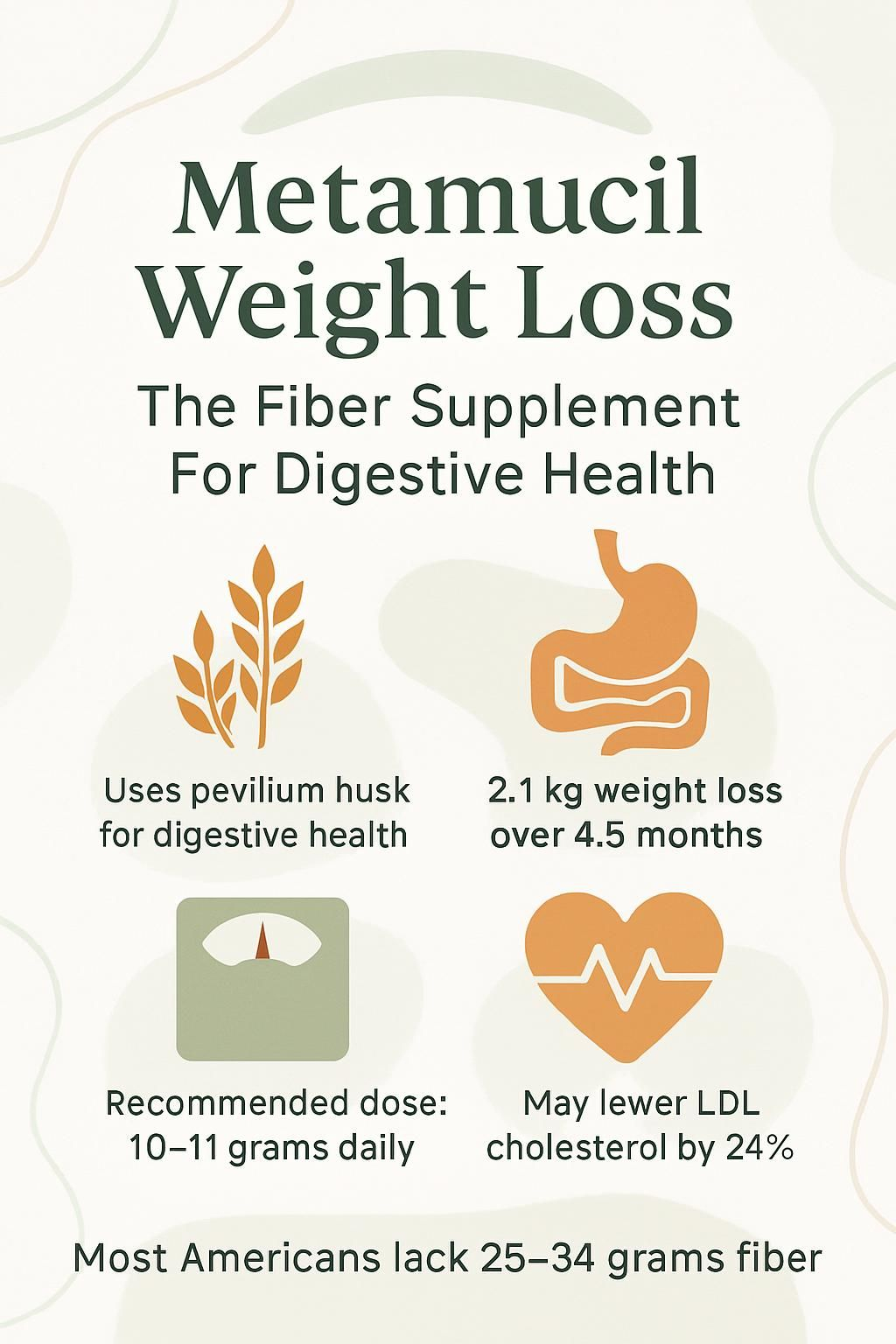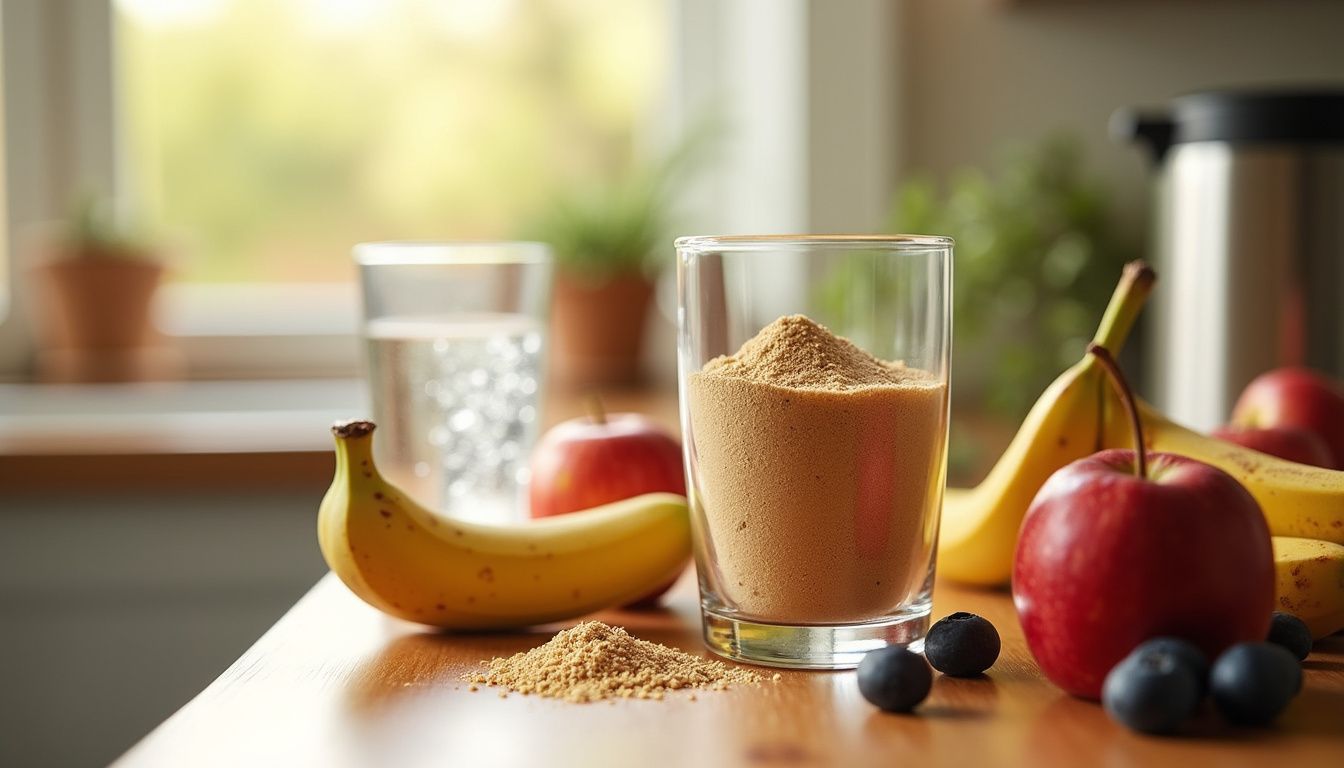Metamucil Weight Loss: The Fiber Supplement For Digestive Health
Our Nutrition Assistant AI Suite will transform your body. You will lose fat, get toned, and build muscle. Gain confidence and optimal health.
If bloating, slow digestion, or stubborn pounds keep getting in your way, you are not alone. Many people use Metamucil, a fiber supplement with psyllium, to support digestive health and appetite control. With steady use, fiber can help you feel fuller and more regular, which may support weight management.
In this guide, you will learn how Metamucil’s psyllium fiber works, what the research says about weight loss, and how to take it safely. You will also see tips to help you meet the daily fiber goal and feel more energetic each day.
Key Takeaways
- Metamucil contains psyllium husk, a soluble fiber from Plantago ovata, that supports regularity and fullness, which helps with weight management.
- A 2023 comprehensive review led by Gibb RD found that taking psyllium before meals helped people lose about 2.1 kg and lower BMI by 0.8 kg/m² over roughly 5 months.
- Typical intake is 10 to 11 grams of psyllium per day, divided into 2 or 3 servings with water before meals, which can reduce appetite and calorie intake.
- Studies report improvements in LDL cholesterol, up to 6 to 24 percent when paired with a heart-healthy diet, and better blood sugar control in people with type 2 diabetes.
- Most Americans fall short of the 25 to 34 grams of daily fiber. Metamucil can help fill this fiber gap, but whole foods should remain the foundation.

What is Metamucil Fiber Supplement?

Metamucil is a fiber supplement made from psyllium husk. Psyllium is a soluble fiber, which means it mixes with water and forms a soft gel in your gut. This gel helps support digestion and makes it easier to meet your daily fiber needs.
What is Metamucil and how does it work?
After you mix a teaspoon of Metamucil with water, the psyllium absorbs liquid and swells into a gel. This gel slows how fast your stomach empties. It can also trap some sugars and cholesterol inside the digestive tract.
As the gel moves through your gastrointestinal tract, it adds bulk and softness to stool, which supports regular bowel movements. Many people also feel fuller between meals since the gel takes up space in the stomach. I felt lighter and more regular after two weeks of daily use at the recommended serving.
This approach gives you a safe way to increase dietary fiber, support regularity, and help manage hunger while working toward weight goals.
What is psyllium husk and why is it important?
Psyllium husk comes from the seeds of Plantago ovata. It is a natural source of soluble fiber that attracts water and forms a gel-like texture in your gut. This helps soften stool and makes bowel movements easier to pass.
Many experts suggest 10 to 11 grams of psyllium each day, split into two or three doses. If you are trying to raise your daily fiber or ease constipation, Metamucil offers a simple way to reach a helpful intake without a major diet overhaul. Surveys show most Americans do not get enough fiber, so supplements can help close the gap.
“I tried mixing one scoop of Metamucil powder into my morning smoothie for two weeks and noticed I felt less hungry between meals.”
Psyllium may also help with blood sugar control and cholesterol management when used as directed. Some studies note modest weight reductions compared with placebo. If you want dependable fiber while you work on weight or digestive goals, psyllium can make consistency much easier.
How Metamucil Supports Digestive Health
Think of psyllium as gentle support for a smoother daily rhythm.
How does Metamucil promote regular bowel movements?
Metamucil’s soluble fiber absorbs water and forms a soft gel that bulks up stool. This makes stool easier to pass and can support regularity. You can use the powder or take 2 to 5 capsules with at least 8 ounces of liquid, up to four times daily, as shown in studies and product labels.
If your usual diet is low in fiber, you might notice steady improvement within the first week. In my own trial, I felt lighter and more energetic after several days. Randomized controlled trials have also reported fewer constipation issues with psyllium compared with placebo.
Can Metamucil reduce bloating and discomfort?
Metamucil can support smoother digestion, which may ease gas and bloating for some people. Start with a low dose, then increase slowly. Doing so gives your digestive system time to adjust.
Drink plenty of water to help the fiber move through your gut and lower the chance of discomfort or blockage. Since many Americans fall short on fiber, adding psyllium often improves regularity within two weeks. When I began with half the usual dose and added extra water, I noticed less bloating and better appetite control.
How does Metamucil support gut health?
Psyllium forms a gel that helps trap waste and move it along your intestines. The fiber itself is not absorbed. It acts like a gentle broom that helps clear the digestive tract.
Psyllium is slowly fermented in the colon, which tends to produce less gas than some other fibers when you increase the dose gradually. It also supports a healthy balance of gut bacteria, which benefits your microbiome. Do not use psyllium as a treatment for conditions such as Crohn’s disease or ulcerative colitis without medical guidance.
Many people report feeling lighter and more energetic after adding psyllium to their routine. Regular fiber intake may support gut function and certain metabolic markers, especially as part of a balanced diet.
Can Metamucil Help with Weight Loss?
Appetite control often starts with simple choices you can repeat every day.
What role does fiber play in weight management?
Fiber slows digestion and increases fullness. Feeling satisfied longer helps reduce calorie intake at meals and snacks. Adults are advised to get about 25 to 34 grams of fiber per day, or roughly 14 grams per 1,000 calories.
Only a small share of Americans meet this target, which can make weight control harder. A fiber supplement like Metamucil can help you reach a better intake while you build higher fiber meals. Since fiber helps you feel less hungry between meals, it is easier to stick to a lower calorie plan.
How does Metamucil create a feeling of fullness?
Metamucil contains psyllium, a gel-forming fiber that absorbs water in your gut. The gel expands and takes up space in the stomach, which increases fullness before and during meals. This can reduce cravings and limit second helpings.
Many users report better appetite control after several weeks of steady use. Research shows fiber supplements can lower calorie intake by helping you feel satisfied with less food. I tried the Two-Week Challenge and found afternoon snacking dropped, which made my meal plan easier to follow.
How does Metamucil affect appetite and calorie intake?
Taking Metamucil 20 to 30 minutes before meals may reduce hunger. The gel slows gastric emptying, so food stays longer in the stomach. That slow pace can help you eat smaller portions and cut extra snacks.
People who use psyllium correctly may lose about a pound per month compared with placebo in clinical data. When I used it before dinner, I felt satisfied sooner and passed on dessert most nights. Pairing fiber with a balanced diet helps support long term results.
Scientific Evidence on Metamucil and Weight Loss
Evidence points to modest, steady effects that add up over time.
What studies support Metamucil’s weight loss benefits?
Psyllium has been studied for its effects on body weight, BMI, and waist size. Highlights include:
- A 2023 comprehensive review and meta-analysis led by Gibb RD found that taking psyllium before meals for a mean of 4.8 months led to an average weight loss of 2.1 kg, a BMI drop of 0.8 kg/m², and a 2.2 cm smaller waist compared with placebo.
- A 2018 study by Noureddin S in people with type 2 diabetes reported less constipation, improved blood sugar markers, and lower body weight with regular psyllium use versus a control group.
- Abutair AS, 2016, observed decreases in BMI and better fasting insulin control among participants who added psyllium compared with those who did not.
- Across trials, groups using psyllium often lost about 2 pounds over 12 weeks versus placebo, likely due to improved fullness and lower calorie intake.
- Consumer health outlets, such as Healthline, report similar benefits for fullness and digestive regularity, which can support weight management.
These findings support the use of psyllium as part of a broader plan that includes diet quality and activity.
What are the limitations of the current research?
Weight changes with psyllium are usually modest. Lasting results depend on your long term eating pattern, total calorie intake, and activity level. Many studies run for only weeks or a few months, so data on year-long outcomes is limited.
Experts also encourage raising fiber from whole foods first. More research is needed to compare long term results from supplements versus high fiber eating patterns. Psyllium can help you get started, yet habits around food quality still matter most.
Additional Health Benefits of Metamucil
Beyond appetite control, psyllium supports other parts of health that you can measure.
How does Metamucil help lower cholesterol?
Psyllium binds some cholesterol in the gut. Your body removes it in waste instead of absorbing it. Studies show daily psyllium can lower LDL, also called bad cholesterol, by about 6 to 24 percent when combined with a heart-smart diet. The FDA authorizes a heart health claim for psyllium fiber used this way.
Many users notice better cholesterol numbers after steady intake. I saw my LDL drop after three months of taking Metamucil as directed. Psyllium may also support fasting insulin in some people when used daily.
Can Metamucil support healthy blood sugar levels?
Psyllium slows the absorption of sugar from meals. This can help maintain healthy blood sugar levels. Clinical studies in people with type 2 diabetes have reported lower fasting glucose and small improvements in A1C, which reflects average 3 month blood sugar.
Mixing Metamucil with yogurt or juice at breakfast may reduce energy dips later. Fiber can steady appetite and help prevent sharp spikes or drops in blood sugar when paired with balanced meals and regular activity.
How does Metamucil improve overall digestive health?
Metamucil brings water into the stool, which softens it and supports regular movements. Since many people do not hit the daily fiber target, this small change can ease common issues like constipation and discomfort.
During my own two week trial, I had fewer episodes of abdominal pain and less bloating. Steady fiber helps keep things moving, which supports comfort and day to day energy.
How to Use Metamucil for Weight Loss
Small, repeatable routines will help you stay on track.
What is the recommended dosage and timing?
A practical target is 10 to 11 grams of psyllium daily, split into 2 or 3 servings. Mix each powder serving with at least 8 ounces of liquid and drink it 20 to 30 minutes before meals. This timing can increase fullness and help control portions.
For capsules, take 2 to 5 capsules up to four times per day with a full glass of water. Many Americans do not meet the fiber goal, so a supplement can help while also supporting digestive comfort and healthy cholesterol. Before meals, I felt fuller and found it easier to avoid overeating.
Should I choose powder or capsules?
Metamucil comes as powder, capsules, wafers, and gummies. Powder is flexible and usually offers more fiber per serving, so many people see faster digestive effects. Capsules are handy for travel or if you prefer not to mix drinks, but you need several capsules to match one powder dose. Five capsules provide about 2 grams of psyllium.
Check labels if you need sugar-free options or if you have phenylketonuria since some flavors contain aspartame. If swallowing pills is hard, a well mixed powder in cool liquid may be easier. Always take psyllium with enough water to reduce the risk of choking or discomfort.
What are some tips for staying consistent?
Build a simple routine. Start with one serving per day, then increase to the full dose over several days. Mix powder in a dry glass first, then add liquid to help it dissolve smoothly.
Add Metamucil to smoothies for variety. Linking your dose to another daily habit, such as breakfast or brushing your teeth, makes it easier to keep going. These steps support regularity and make it more likely that fiber will help with appetite control.
Metamucil’s Two-Week Challenge
Two weeks is long enough to notice if a habit fits your life.
What is the Two-Week Challenge?
The Two-Week Challenge encourages you to use Metamucil every day for 14 days. You get simple instructions, reminders, and tips based on the recommended dose. This short window helps you see benefits like better regularity and less bloating.
Since many people fall short on daily fiber, this challenge can help you close that gap and test a routine that supports digestive function.
What benefits can I expect from the challenge?
Most participants report feeling lighter and more energetic. Smoother bowel movements and less bloating are common early wins. Appetite often feels easier to manage once the fiber routine settles in.
Some people also see improvements in cholesterol or steadier blood sugar. These changes support weight management and day to day comfort while you work toward the fiber goal.
How can I maximize results during the challenge?
Consistency matters most, but a few tactics can make results stronger:
- Pick a form and flavor you like, such as orange, so you stay with it.
- Increase your dose gradually to give your gut time to adjust.
- Follow product directions and your healthcare team’s advice for safe use.
- Invite a friend to join you for accountability and support.
- Drink plenty of water to help the fiber move through your gut.
- Take Metamucil at the same times each day to build a routine.
- Pair doses with meals rich in fruits, vegetables, and beans.
- Track changes in bloating, appetite, and weight with a journal or app.
- Limit sugary drinks, and use a sugar substitute if you want sweetness with fewer calories.
- Talk to your doctor first if you take medicines or have Crohn’s disease, allergies, or any new or severe symptoms.
I shared the challenge with my sister and we texted reminders each night. Around day ten, we both noticed steadier digestion, which made the routine easier to keep.
Potential Side Effects and Safety Precautions
Knowing what to expect helps you use fiber with confidence.
What are common side effects like bloating or gas?
Some people feel gas, bloating, or mild cramps when they first increase fiber. This often happens if the dose rises too quickly or if water intake is low. Since fewer than 1 in 10 Americans hit the fiber target, the body may need time to adjust.
To ease symptoms, add fiber slowly and drink more fluids. People with Crohn’s disease or allergies should check with a doctor before starting any fiber supplement. Severe or persistent symptoms need medical care.
Who should consult a doctor before using Metamucil?
Some groups should always speak with a healthcare provider first. People with diabetes need to confirm how psyllium fits with their blood sugar plan. Those with Crohn’s disease or ulcerative colitis should get guidance to avoid flare ups.
Stop using psyllium and seek care if you have severe pain, rectal bleeding, vomiting, or constipation that lasts more than 7 days. These signs can point to a serious problem. I also checked for medicine interactions with my doctor before starting psyllium.
Can Metamucil interact with medications?
Psyllium’s gel can delay or reduce how some medicines are absorbed. To reduce this risk, separate Metamucil and other medicines by at least 2 hours. If you take prescription drugs for diabetes, cholesterol, heart disease, or other conditions, ask your healthcare provider for advice.
Fiber supports digestive health, but safe timing helps you avoid unwanted interactions.
Building a Weight Loss Plan with Metamucil
Think of psyllium as a helper that works best with smart meals and movement.
How to combine Metamucil with a healthy diet?
First, raise fiber from food. Add oranges, beans, lentils, carrots, oats, and whole grains. Use Metamucil if you still fall short of the 25 to 34 gram daily goal. Take it with a full glass of water to support digestion and reduce overeating.
Keep meals balanced with fruits, vegetables, and legumes. Smaller, fiber rich portions can help control calories before you consider extra doses. Track your food and fiber intake to see what works for you.
Why is regular exercise important?
Activity helps you burn calories and maintain muscle while you eat fewer calories. Even a 5 to 10 minute walk after meals can steady blood sugar and aid digestion. This small habit pairs well with fiber intake.
Research shows people who combine regular movement with fiber are more successful with weight management. A short walk after your daily dose or after eating an orange can support results.
How can I track progress beyond the scale?
A DEXA scan can show changes in fat, muscle, and bone, which offers more detail than a home scale. If that is not available, track energy levels, regularity, appetite, and how your clothes fit.
Write down small wins, such as fewer cravings or less bloating. These signs show progress while the numbers catch up.
Frequently Asked Questions About Metamucil
Quick answers can make your next step easier.
How quickly can I see weight loss results?
Metamucil supports weight goals, but changes build over time. With the right dose and daily use, many people see about 1 pound per month. Appetite control and bowel regularity may show up in 1 to 2 weeks, and some notice larger changes by 12 weeks.
I felt less hungry by the second week, and smaller portions were enough. Track early signs so you can see progress before the scale moves much.
What is the best time to take Metamucil?
For appetite control, take it 20 to 30 minutes before meals with at least 8 ounces of water. This timing increases fullness and can reduce calories at the meal. Stay upright after drinking it to lower the chance of discomfort.
Using the same times each day helps you stay consistent and reach your goals.
Can Metamucil replace meals?
No. Metamucil is a fiber supplement, not a meal. It does not provide protein, healthy fats, vitamins, or minerals that you need for health. Use it to support a balanced diet.
Replacing meals with psyllium led me to feel tired and hungry before lunch. A balanced meal plan, plus fiber, works better for energy and steady progress.
Conclusion
Metamucil, a psyllium fiber supplement, can support better digestive health and may help with weight management by increasing fullness and improving regularity. Research shows modest weight and cholesterol benefits, especially when combined with a nutrient dense diet and daily movement.
Whole foods should remain your base, and a supplement can help you close the fiber gap. Talk with a healthcare provider before starting if you have medical conditions, take medicines, or notice concerning symptoms. Used at the proper dose, psyllium can make healthy habits easier to keep, and that consistency leads to steady results over time.
FAQs
1. What is Metamucil and how does it support weight loss and digestive health?
Metamucil is a fiber supplement that contains psyllium husk. This fiber helps regulate digestion and may support weight loss by increasing feelings of fullness. Studies show that dietary fiber can help control appetite and improve digestive function.
2. How much Metamucil should I take for digestive health benefits?
The recommended dose in biochemistry studies varies, but most adults start with one rounded teaspoon mixed with at least 8 ounces of water up to three times daily. Always follow the instructions on the product label or consult a healthcare provider.
3. Are there any side effects from using fiber supplements like Metamucil?
Some people may experience mild bloating or gas when starting fiber supplements. These effects often decrease as your body adjusts to increased fiber intake. Drinking enough water helps reduce these symptoms.
4. Can fiber supplements replace dietary fiber from food?
Fiber supplements such as Metamucil provide extra fiber, but they do not replace all the nutrients found in whole foods like fruits, vegetables, and grains. A balanced diet rich in natural sources of fiber remains important for overall health.
Summary:
Metamucil is a widely used fiber supplement shown to support digestive health and weight management by promoting satiety and regularity. Following recommended doses helps maximize benefits while minimizing side effects. Fiber supplements work best when combined with a healthy diet rich in whole foods.







